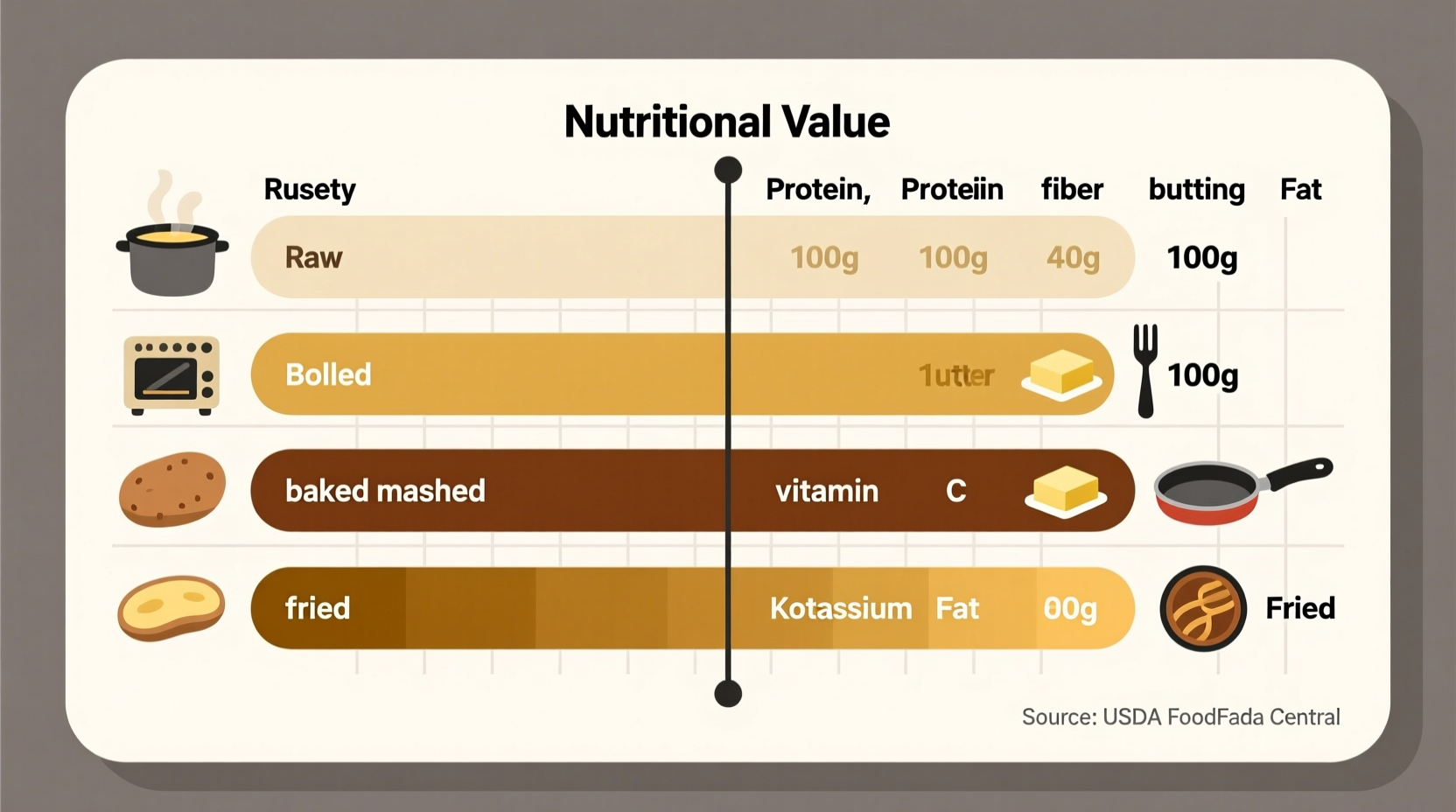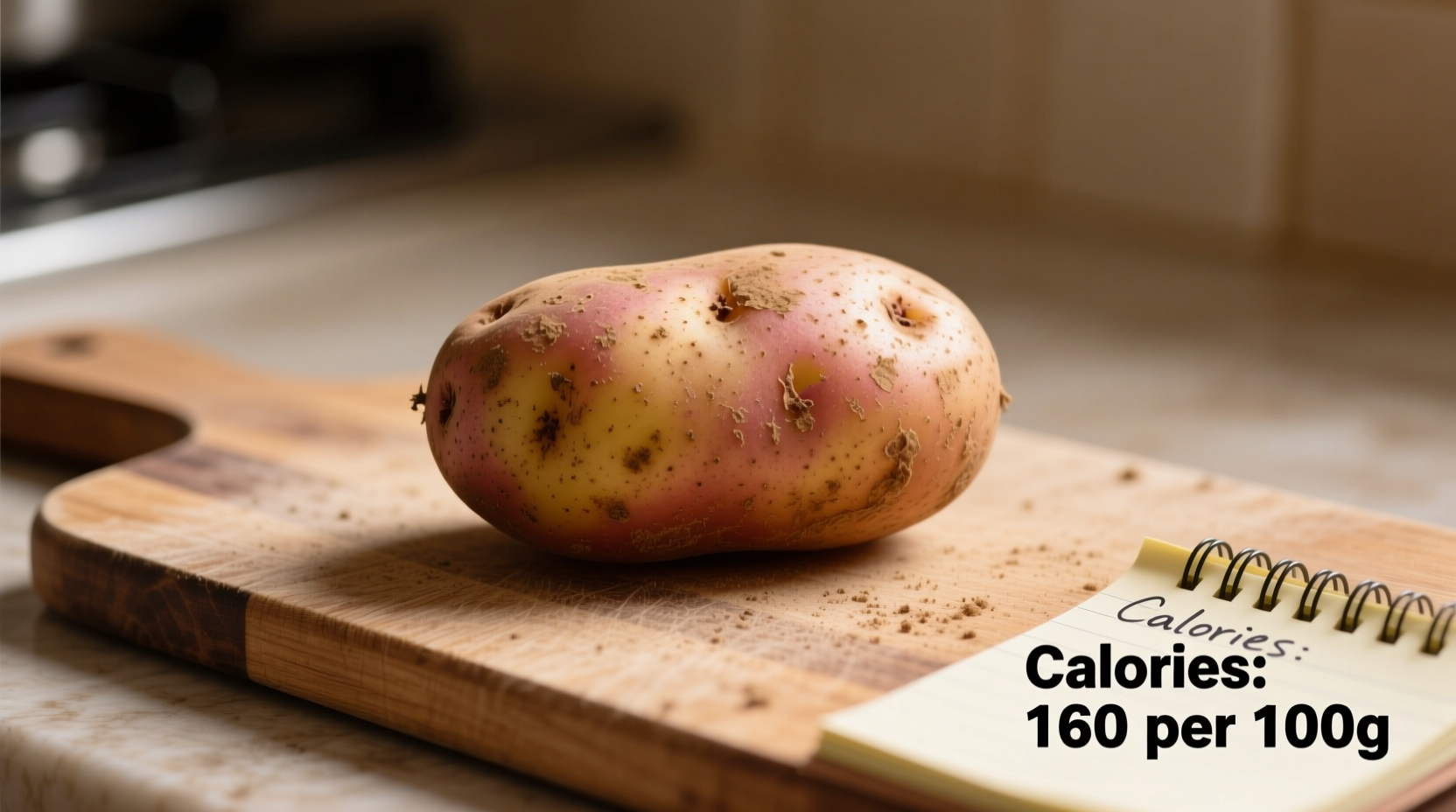Discover exactly how many calories you're consuming with russet potatoes and how preparation methods dramatically impact their nutritional profile. This comprehensive guide delivers precise USDA-sourced data, practical portion guidance, and science-backed preparation tips to help you enjoy this versatile staple while meeting your dietary goals.
Understanding Russet Potato Nutrition: The Complete Breakdown
When you're tracking your daily nutrition, knowing the exact nutritional composition of russet potatoes is essential. These starchy staples serve as a dietary foundation across cultures, but their nutritional value changes significantly based on preparation. Let's examine the core nutritional facts you need.
| Nutrient | Per 100g Raw | Per Medium Potato (150g) | % Daily Value* |
|---|---|---|---|
| Calories | 79 kcal | 118 kcal | 6% |
| Carbohydrates | 18.1g | 27.2g | 9% |
| Dietary Fiber | 2.2g | 3.3g | 12% |
| Protein | 2.0g | 3.0g | 6% |
| Vitamin C | 19.7mg | 29.6mg | 33% |
| Potassium | 421mg | 632mg | 13% |
*Based on a 2,000 calorie diet. Source: USDA FoodData Central, accessed September 2025
This nutritional profile comes directly from the USDA's comprehensive food composition database, the gold standard for nutritional information in the United States. The data reflects raw russet potatoes with skin, providing the baseline for understanding how cooking methods alter these values.
How Preparation Methods Transform Calorie Content
Your cooking technique dramatically impacts the final calorie count of russet potatoes. Understanding these variations helps you make informed dietary choices:
- Baked russet potato (with skin): 168 calories for a medium potato (150g) - the dry heat concentrates natural sugars slightly while preserving nutrients
- Boiled russet potato (with skin): 134 calories for a medium potato - water absorption slightly dilutes calorie density
- Mashed russet potato (without additions): 134 calories per serving - similar to boiled, but texture changes affect satiety
- Fried russet potato (steak fries): 365 calories for a standard restaurant serving - oil absorption significantly increases calorie density
- Air-fried russet potato: 185 calories for equivalent portion to fried - substantially lower fat absorption

Portion Size Matters: Practical Measurement Guide
Accurate portion control separates healthy potato consumption from excessive calorie intake. Many people unknowingly double or triple standard portions, throwing off their nutritional calculations.
A medium russet potato equals:
- One baseball-sized whole potato (about 5-6 inches long)
- One cup diced (about 160g)
- Half cup mashed (about 80g)
- Three-quarters cup boiled cubes (about 120g)
Registered dietitians recommend weighing potatoes before cooking for the most accurate tracking, as cooking methods cause varying degrees of water loss or absorption. A kitchen scale provides the precision needed for serious nutritional management.
Russet Potatoes in Dietary Context: Beyond Calories
While calorie count matters, the complete nutritional picture determines how russet potatoes fit into various eating plans. Consider these factors when incorporating them into your diet:
Glycemic Impact Considerations
Russet potatoes have a high glycemic index (85-110 depending on preparation), meaning they can cause rapid blood sugar spikes. However, research from the American Journal of Clinical Nutrition shows that cooling cooked potatoes increases resistant starch content, lowering their glycemic impact by up to 25%. This makes potato salad potentially more blood-sugar friendly than hot mashed potatoes.
Weight Management Strategies
Despite their carbohydrate content, russet potatoes can support weight management when prepared properly. The high fiber content (particularly in the skin) promotes satiety. A study published in Nutrients found that participants who included moderate portions of boiled potatoes in their diet reported greater fullness and consumed fewer overall calories throughout the day.
Comparison With Other Potato Varieties
Russet potatoes contain slightly more calories and carbohydrates than some alternatives:
- Russet: 168 calories per medium potato
- Yukon Gold: 150 calories per medium potato
- Red potato: 130 calories per medium potato
- Sweet potato: 112 calories per medium potato
However, russets provide more potassium and vitamin C than many alternatives. The choice depends on your specific nutritional priorities and culinary application.
Maximizing Nutritional Value: Smart Preparation Techniques
You can significantly enhance the nutritional profile of russet potatoes through strategic preparation:
- Cook with skin intact: Retains up to 50% more fiber and nutrients that concentrate near the skin
- Cool before eating: Increases resistant starch content by 15-25%, improving blood sugar response
- Pair with healthy fats: Combining with olive oil or avocado improves absorption of fat-soluble vitamins
- Add vinegar: Research shows acidic components can lower the glycemic response by up to 30-35%
- Avoid excessive processing: Mashing or ricing breaks down fiber structure, increasing glycemic impact
Professional chefs like Antonio Rodriguez emphasize that simple preparation often yields the most nutritionally beneficial results: "The healthiest russet potato preparation is often the simplest - baked with skin, cooled slightly, and seasoned with herbs rather than heavy fats. This approach preserves nutrients while creating satisfying texture and flavor."
Practical Incorporation Into Your Meal Plan
Here's how to include russet potatoes in various dietary approaches:
- For weight loss: Limit to 1/2 medium potato (75g) per meal, prepared by baking or boiling with skin
- For athletic performance: Include 1 medium potato post-workout for optimal carb replenishment
- For diabetes management: Pair 1/3 medium potato with protein and non-starchy vegetables
- For general health: Enjoy 1 medium potato 2-3 times weekly as part of balanced meals
Remember that context matters more than isolated numbers. A russet potato served with grilled chicken and roasted vegetables creates a nutritionally balanced meal, while the same potato loaded with butter, sour cream, and bacon becomes a calorie-dense side dish.











 浙公网安备
33010002000092号
浙公网安备
33010002000092号 浙B2-20120091-4
浙B2-20120091-4